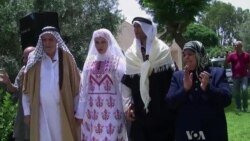DIBBYEH, LEBANON —
In Palestinian refugee camps across Lebanon, an organization called the Social Support Society tries to provide elderly Palestinians with places to socialize and activities like arts and crafts and field trips. The society also hosts weddings for young Palestinian couples, giving the elderly a chance to celebrate and pass on some of the traditions of their homeland.
At a Palestinian wedding in Dibbyeh, Lebanon, many traditional customs are practiced, including the Debke - a dance performed throughout the region. The Palestinian version dates back hundreds of years. The attire, food and music are also traditional.
While many young Palestinian couples opt for modern weddings, having a traditional wedding honors their ancestors and keeps the Palestinian heritage alive, says 62-year-old Shafika Shalaan, originally from Aqqa, now the city of Acre in Israel.
"This wedding is really important because it reminds us with our culture and our heritage so we will not forget it and at the same time, we can deliver it to the new generations," she said.
Life for the Palestinians in Lebanon is hard. Most reside in one of the country’s 12 refugee camps, where conditions are cramped, unsanitary and unsafe.
Because of their status in the country, many cannot find work and lack access to higher education and health care. Many elderly Palestinians realize they will likely die refugees.
For them, weddings are an especially joyous occasion.
"The Palestinian wedding should keep going for seven days before the wedding, and on the wedding night, they … apply henna, the bride on two hands with henna, the groom on one hand," said Asriye el Ali, 67. "The day of the wedding … they bring elderly women to sing and they sing while the brides' parents' family makes the food. And they bring a barber to cut the groom's hair."
While this ceremony did not observe all the customs, many - such as the Oud playing - were authentic.
Reviving traditional weddings is an initiative of the Social Support Society, which sponsored the wedding. The organization selects engaged couples who cannot afford to pay for a wedding.
Head of the Society Melek Nimer says they want the elderly to feel needed.
"We tell them, 'You're the only ones who know how weddings used to be in Palestine, so you tell us what to do and what not to do, and how to do,' so they become vicious event planners for a couple of weeks," Nimer said. "They order everyone around and they feel very important."
The ululation or "zaghareet" can indicate the arrival of the bride or represent an expression of joy. While many older Palestinians in Lebanon see the ceremonies as a way to preserve their culture, for some, it also offers a chance to forget about their suffering.
At a Palestinian wedding in Dibbyeh, Lebanon, many traditional customs are practiced, including the Debke - a dance performed throughout the region. The Palestinian version dates back hundreds of years. The attire, food and music are also traditional.
While many young Palestinian couples opt for modern weddings, having a traditional wedding honors their ancestors and keeps the Palestinian heritage alive, says 62-year-old Shafika Shalaan, originally from Aqqa, now the city of Acre in Israel.
"This wedding is really important because it reminds us with our culture and our heritage so we will not forget it and at the same time, we can deliver it to the new generations," she said.
Life for the Palestinians in Lebanon is hard. Most reside in one of the country’s 12 refugee camps, where conditions are cramped, unsanitary and unsafe.
Because of their status in the country, many cannot find work and lack access to higher education and health care. Many elderly Palestinians realize they will likely die refugees.
For them, weddings are an especially joyous occasion.
"The Palestinian wedding should keep going for seven days before the wedding, and on the wedding night, they … apply henna, the bride on two hands with henna, the groom on one hand," said Asriye el Ali, 67. "The day of the wedding … they bring elderly women to sing and they sing while the brides' parents' family makes the food. And they bring a barber to cut the groom's hair."
While this ceremony did not observe all the customs, many - such as the Oud playing - were authentic.
Reviving traditional weddings is an initiative of the Social Support Society, which sponsored the wedding. The organization selects engaged couples who cannot afford to pay for a wedding.
Head of the Society Melek Nimer says they want the elderly to feel needed.
"We tell them, 'You're the only ones who know how weddings used to be in Palestine, so you tell us what to do and what not to do, and how to do,' so they become vicious event planners for a couple of weeks," Nimer said. "They order everyone around and they feel very important."
The ululation or "zaghareet" can indicate the arrival of the bride or represent an expression of joy. While many older Palestinians in Lebanon see the ceremonies as a way to preserve their culture, for some, it also offers a chance to forget about their suffering.





